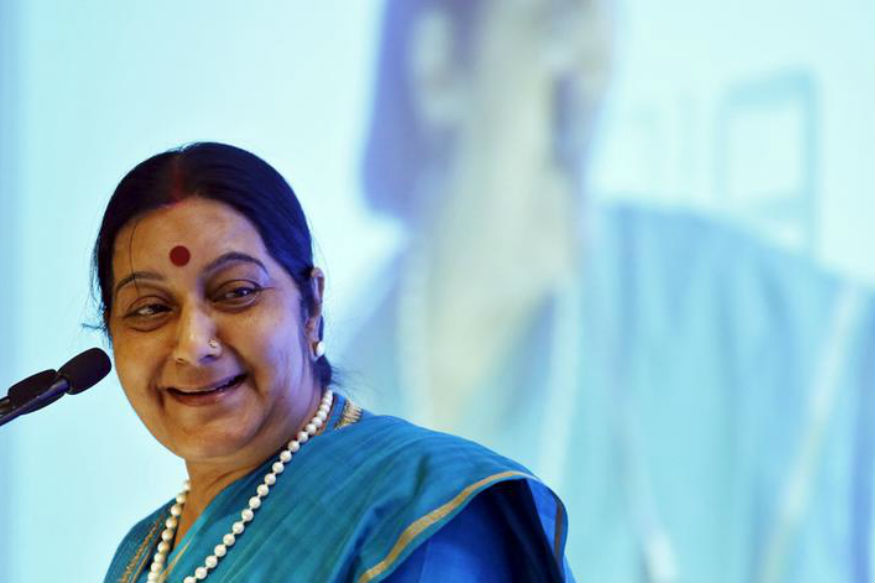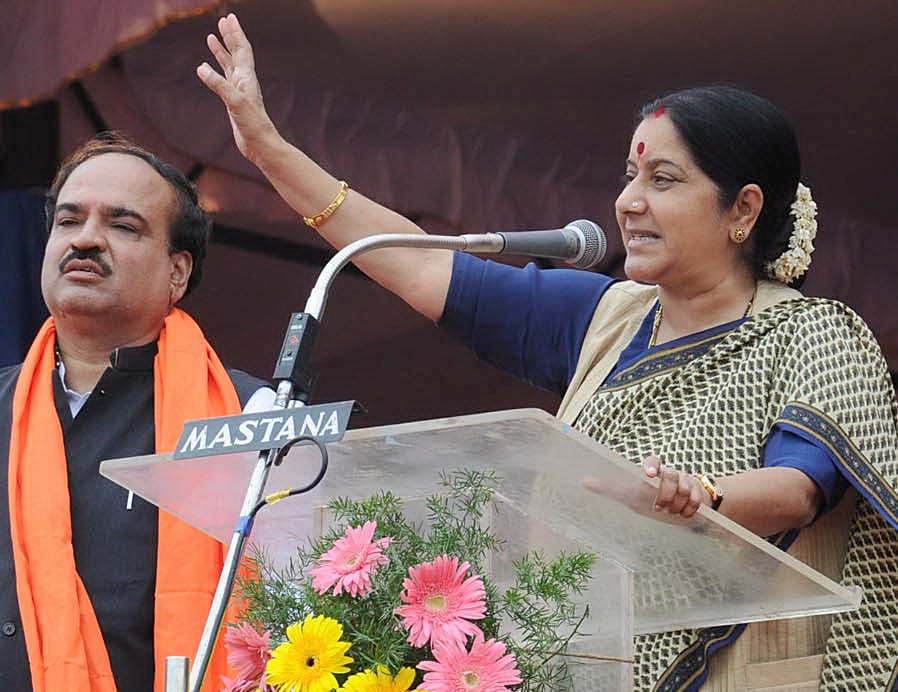Sushma Swaraj would often tell journalists that politicians should never shy away from ‘challenges’. She often turned challenges into opportunities and thus when Atal Bihari Vajpayee and veteran Advani entrusted her to fight Sonia Gandhi, she wasted no time and landed in Bellary.
– Nirendra Dev

Wonderful things happen in wonderful ways. Sushma Swaraj’s rise in the BJP was dazzling in more ways than one and she owed it largely to party’s original ‘talent spotter’ L K Advani; and of course the party’s media cell. Once given the charge to interact with media and take up the role of party’s spokesperson – something no other national party had banked on a woman till 1990s– Sushma Swaraj knew the art of treading the path.
Around mid 2005 – when BJP was still battling with the crisis triggered by Advani’s “Jinnah was a secular leader statement”, Sushma Swaraj would tell journalists – “It is better to be silent and much better to be a learned fool these days”. Like many leaders of her ‘generation’ – the likes of Pramod Mahajan, Arun Jaitley and Venkaiah Naidu – some little senior; some little junior to her – Sushma also knew the gravity of the situation. In fact, she was among the few leaders who admitted around September 2005 – of course informally – that the BJP could soon have a new president by the year end and Advani’s ‘exit’ was imminent.
But she knew how to take the journalists into confidence and cleverly remarked: “Hum sabhne Advaniji ke bahut mithai aur namak khaen haen”. The English translation would certainly and simply fail to carry the meaning of these words. In terms of giving sound-bytes and explaining party’s position clearly to media – when BJP was easily described as a ‘communal outfit’ and underestimated as a party of Hindi belt and that too of Baniya-Brahmin brigade, Sushma Swaraj brought a refreshing change.
She appealed to Indian women. The Hindi and the middle class mannerism impressed emerging and aspiring Indians of post 1991 liberalisation era. Putting her into ‘spokesperson’s role’ was one of the many masterstrokes of veteran Advani as Late Swaraj had command over both Hindi and English. More importantly, she was a ‘keen learner’ about so many things – so essential in a vast country with varied cultures. “My husband knows north east much better, you can always help me with background information,” she would tell me around 1998 – when Swaraj Kaushal was appointed by Vajpayee government as ‘negotiator’ for Naga peace talks.
Hence in 2014, when it came to the parliamentary debate on Telangana statehood – she used Telugu phrases to drive home the point that the people of newly created state should not give all credit to Sonia-amma alone – as she as ‘cheen-amma’ also played a part in speeding up the process of bifurcation of Andhra Pradesh. BJP deserved some credit, she emphasised more than once.
On February 14, 2014 as Andhra Pradesh Reorganisation Bill was being passed, Sushma Swaraj said the children and youngsters of Telangana should know that it was not only “Sonia amma” (Sonia Gandhi) who got them a separate state but this “Cheen-amma” (an aunt) also contributed her part.
Telugu journalists would recall this even this day that ‘young voters’ of newly crafted state of Telangana – and especially BJP supporters – were thrilled to listen to Sushma’s address – though she spoke in Hindi.
Politics – A challenge

The politics has been a challenging phenomenon always and more so for a woman. Without doubt, Sushma Swaraj often ventilated her thoughts to those whom she trusted on these lines as she faced tough ‘competitions’ more than once from several of her contemporaries who were adept at power play.
But she would often tell journalists that politicians should never shy away from ‘challenges’. In fact, she often turned challenges into opportunities and thus when Atal Bihari Vajpayee and veteran Advani entrusted her to fight Sonia Gandhi – she wasted no time and landed in Bellary in a cream sari with saffron border and green blouse. The national tri-colour was given a symbolic push up when ‘Italy born’ Sonia Gandhi was to contest her maiden election.
“This dress was suggested by some party workers, but final decision was mine,” she told some women journalists.
Some media persons – who befriended her also knew she would call them on birthdays. She knew many journalists – female or male – by their first name and would address them with affection and as a matter of right.
True it is man’s nature that the moment a person becomes rare and has gone far away, he or she gains immense worth. When it comes to ‘death’, the man has always tried hard to hold the dear ones closer, but like all good things have an end – so has been Sushma’s life and career.
When it comes to Sushma, journalists knew meeting her would certainly give a story – yes, she was aware of this. “I know I am good story teller,” she remarked once in a jovial mood. But considered ‘the most effective spokesperson’ in the BJP, at times she had a few fault lines too. Some would say those were mistakes, others believe they were ‘deliberate’.
During the Agra Summit between Prime Minister Atal Bihari Vajpayee and Gen Pervez Musharraf, Sushma was Information and Broadcasting Minister. But as the visit of Musharraf had begun in Delhi and parleys went on in Delhi and in Agra, Late Swaraj often sat in television studios for debate and gave out some knockout punches.
Finally when the talks collapsed, Major-Gen Rashid Quereshi, military spokesman for the visiting Pakistani President blamed the ‘hidden hand’ for talks failure.
Some hours before that, a visibly upset Gen Musharraf told Indian editors at his breakfast meeting – “She (Sushma) talked about everything — trade, prisoners of war, cross-border terrorism…. but ladies and gentlemen, we spent most of our time discussing Kashmir”.
Sushma Swaraj was reportedly directed by Advani later to issue a clarification and she told Indian scribes – “I am not a saboteur” and admitted Kashmir was discussed between two sides. However, she hastened to add: “my purpose was also to highlight the issues that are of priority to India”.
After 2009 poll debacle when Advani himself decided to opt for a change in leadership in the Lok Sabha for the party; Sushma Swaraj used to be very particular and used to tell media: “Never report, I have replaced Advaniji…We have grown up under him. It is only at his directives that I decided to take the responsibility”.
So, even till this day many scribes would remain confused on how and why really the Agra talks failed.
Sushma Swaraj – would go down the memory lane for journalists – as a pleasant demeanour. A leader who would be frank and also remember people either to ask; –“aur bhai kaise chal raha hae”.
She knew media too well to ask scribes – “Why you left that organisation, was it money or atmosphere?”
But not many can say – that unlike many contemporary spokespersons of her time in all parties – Sushma Swaraj would believe in ‘planting stories’ against her detractors.
(Nirendra Dev is a senior journalist based in Delhi and have worked for PTI, The Statesman and UNI)














Comments